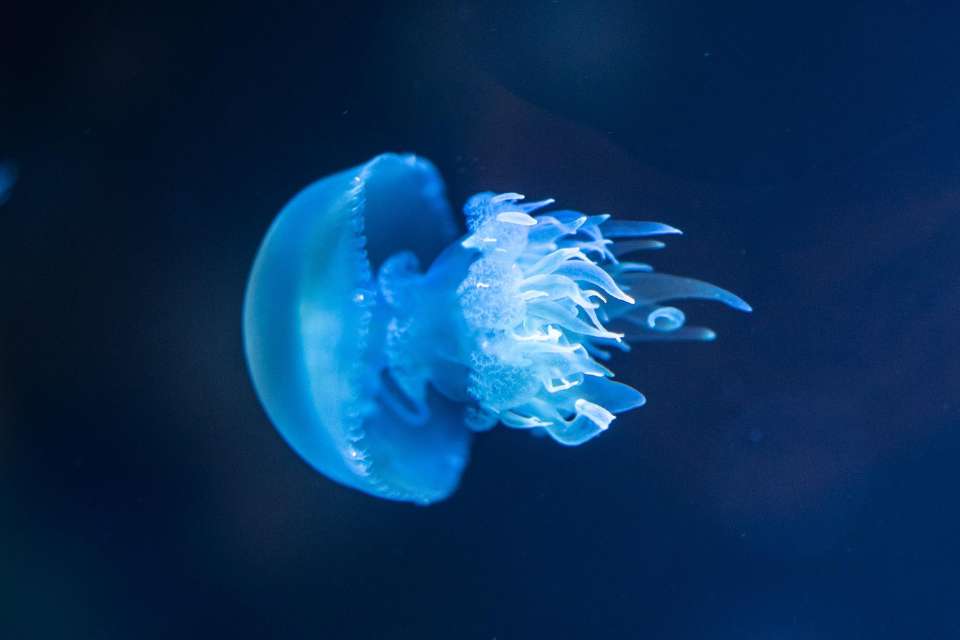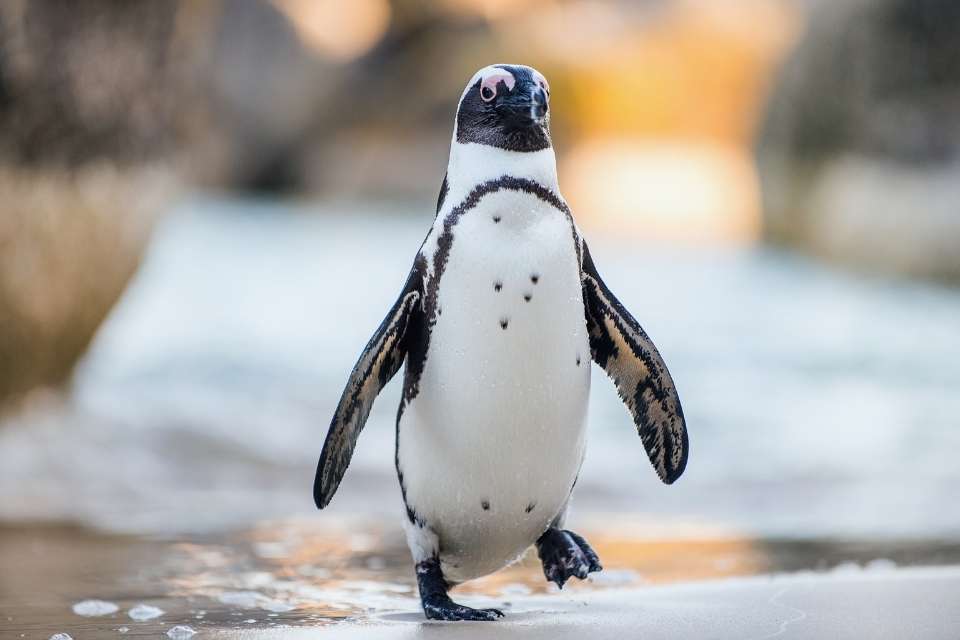When we think of penguins, fish and krill are usually the first foods that come to mind. These high-energy options have long been associated with the feeding habits of these remarkable creatures. However, recent research has challenged this assumption and shed light on the surprising dietary choices of penguins.
A study conducted by an international consortium of scientists has unveiled a new revelation – penguins also consume jellyfish! This unexpected finding challenges our understanding of penguin feeding habits and raises intriguing questions about their diet and nutritional needs.
Key Takeaways:
- Penguins, known for their preference for fish and krill, have been found to actively consume jellyfish.
- This discovery suggests that penguin diets may be more versatile and adaptable than previously believed.
- Penguins specifically target carnivorous jellyfish, indicating potential nutritional benefits from consuming gelatinous prey.
- The interaction between penguins and jellyfish has ecological implications, potentially affecting the global carbon cycle.
- Understanding the complex feeding behavior of penguins is crucial for comprehensive ecological studies and conservation efforts.
Penguin Diet and Food Preferences
Penguins are fascinating creatures with unique dietary habits. Traditionally, it was believed that their diet primarily consisted of fish and krill due to their high caloric demands.
However, recent research has shed new light on the food preferences of penguins and challenged these long-held beliefs.
While fish and krill remain staple foods for penguins due to their energy density, the surprising discovery of penguins feeding on jellyfish has expanded our understanding of their diet.
The inclusion of jellyfish in the penguin diet raises questions about their food preferences and the potential nutritional benefits of consuming gelatinous prey. Penguins’ high caloric needs necessitate the consumption of energy-dense foods, and fish and krill provide more calories per gram than jellyfish.
However, this newfound behavior suggests that penguins’ diet may be more versatile than previously thought.
It’s fascinating to consider the factors that influence penguins’ food preferences. Are they drawn to the unique taste or texture of jellyfish? Or do the gelatinous prey offer specific nutrients that are beneficial for penguins’ overall health and energy requirements?
Investigating penguins’ food preferences and the potential benefits of including jellyfish in their diet will contribute to our understanding of their ecological role and assist in conservation efforts.
To shed further light on penguins’ dietary habits, we need to delve deeper into their feeding behavior and explore the factors influencing their choices. Let’s explore this fascinating topic further in Section 3.
Penguin Feeding Behavior
When it comes to their feeding habits, penguins have proven to be quite versatile and adaptable. A study conducted by an international consortium of scientists focused on four different penguin species: Magellanic penguins, Adélie penguins, little penguins, and yellow-eyed penguins.
The objective was to observe their feeding behavior and gain insights into their dietary preferences.
What the researchers discovered was unexpected – penguins frequently targeted and consumed jellyfish. This finding challenges the notion that penguins solely rely on fish and krill for sustenance.
The footage captured by strapping miniature video cameras to the penguins revealed approximately 200 strikes on jellies at various sites, indicating that this behavior is not accidental but rather intentional.
This discovery suggests that penguins actively seek out gelatinous prey as part of their natural feeding habits. In addition to their known preference for energy-dense foods like fish and krill, penguins seem to have a taste for jellyfish, further expanding their range of dietary options.
“The high number of jellyfish strikes we observed in the footage indicates that penguins actively target these gelatinous organisms. This behavior challenges what we thought we knew about penguin feeding habits and highlights the complexity of their ecological role.”
This surprising feeding behavior not only emphasizes the adaptability of penguins but also sheds light on their interactions with marine creatures like jellyfish.
As penguins actively hunt and consume jellyfish, they play a unique role in the predator-prey dynamic of marine ecosystems.
The Impact of Penguin Feeding Behavior
This unexpected behavior raises several questions: What is it about jellyfish that attracts penguins? Are there specific nutritional benefits that penguins gain from consuming these gelatinous organisms?
Further research is required to delve deeper into these intriguing aspects of penguin feeding habits and their implications for penguin conservation and ecosystem management.
- Why do penguins target jellyfish as part of their feeding habits?
- What nutritional benefits do jellyfish provide to penguins?
- How does the consumption of jellyfish affect the broader marine ecosystem?
Understanding the complexities of penguin feeding behavior is crucial for comprehending their role in marine ecosystems and ensuring the conservation of these fascinating creatures.
As we continue to unlock the mysteries of penguins and their interaction with marine creatures like jellyfish, we gain invaluable insights into the intricate dynamics of our oceans.
Potential Benefits of Jellyfish Consumption
In our study, we made a fascinating discovery: penguins have a preference for consuming carnivorous jellies over herbivorous ones. This indicates that there may be specific nutrients or elements present in carnivorous jellies that are beneficial for penguins.
One hypothesis put forward by researchers is that by consuming carnivorous jellies, penguins may gain access to the nutrients present in the jellies’ prey. These could include small crustaceans that are otherwise challenging for penguins to target themselves.
This suggests that penguins may enjoy indirect benefits from jellyfish consumption, giving them access to a wider variety of prey items.
Another advantage of consuming jellyfish is that they may provide easier targets for penguins compared to fish. Fish can be fast and agile, swiftly swimming away from pursuing penguins.
On the other hand, jellyfish tend to have a slower, more pulsating movement, making them more accessible to penguins. This ease of capture could make jellyfish a convenient and efficient food source for these charismatic birds.
“Penguins targeting carnivorous jellies suggests potential nutritional benefits from consuming these gelatinous prey items.”
While our study has shed light on some aspects of penguins consuming jellyfish, there is still much to uncover. The exact reasons for their preference and the full range of potential benefits are still being explored.
Further research will help deepen our understanding of the implications and significance of jellyfish consumption for penguin populations.
Ecological Implications of Penguin and Jellyfish Interaction
The discovery of penguins actively consuming jellyfish has significant implications for the global carbon cycle.
Previously, it was believed that jellyfish primarily lived in the water column, eventually sinking to the seafloor and playing a role in transporting carbon from the surface to deeper parts of the ocean. However, the newfound knowledge that penguins consume jellyfish raises the possibility of reevaluating carbon flux estimates.
This exciting discovery highlights the intricate interactions between marine predators like penguins and gelatinous organisms like jellyfish in marine ecosystems.
These interactions go beyond the simple predator-prey relationship and have broader ecological implications that warrant further investigation.
Penguins as Jellyfish Predators
The video recordings of penguins actively hunting and consuming jellyfish refute previous suggestions that the presence of jellyfish DNA in penguin guano was due to accidental ingestion or prey consumption.
The deliberate captures of jellyfish by penguins indicate that they are effective predators of gelatinous prey.
Penguins have joined the ranks of sea turtles and ocean sunfish as one of the few animals known to actively hunt and consume jellyfish.
This designation of penguins as jellyfish predators expands our understanding of their feeding behavior and ecological role.
As we continue to study penguins and marine creatures, it is clear that their diet is more versatile than previously thought.
The inclusion of jellyfish in their feeding habits provides valuable insights into their nutritional needs and interactions with the marine ecosystem.
The Significance of Penguins and Jellyfish Interactions
The fact that penguins actively consume jellyfish adds to our understanding of their feeding habits. It challenges previous assumptions about their diet and highlights the complexity of their foraging behavior.
The inclusion of jellyfish in the penguin diet expands their range of prey and suggests a more versatile feeding strategy than previously believed.
Further research is needed to fully comprehend the specific reasons behind penguins’ jellyfish consumption. Scientists are eager to explore the potential nutritional benefits that jellyfish may provide to penguins.
Understanding the role that jellyfish play in the penguin diet can provide valuable insights into their overall health and well-being.
“The inclusion of jellyfish as part of the penguin diet challenges our longstanding assumptions about their feeding preferences and opens up new avenues of research.” – Dr. Lisa Anderson, Marine Biologist
This interaction between penguins and jellyfish also has broader implications for understanding marine ecosystems. Considering gelatinous organisms like jellyfish as regular prey for marine predators is important in studying the intricate balance of these ecosystems.
It highlights the interconnectedness between different species and the role that penguins play within this intricate web of life.
Fact: Penguins, known for their cute and waddling appearance, are more than just adorable creatures. These fascinating birds are skilled hunters with unique feeding behaviors, as evidenced by their surprising consumption of jellyfish.
- Penguins’ consumption of jellyfish challenges previous assumptions about their diet.
- Studying the reasons behind penguins’ jellyfish consumption can provide insights into their nutritional needs.
- Understanding the interaction between penguins and jellyfish expands our knowledge of marine ecosystems.
Conclusion
The recent discovery of penguins actively consuming jellyfish has revealed fascinating insights into their diet and feeding habits.
We now know that penguins specifically target gelatinous prey, particularly carnivorous jellies, suggesting there may be unique nutritional benefits associated with consuming jellyfish.
This finding challenges the traditional understanding of penguin feeding habits, which primarily focused on fish and krill.
Furthermore, the interaction between penguins and jellyfish has broader ecological implications. The fact that penguins actively hunt and consume jellyfish raises questions about the role of these gelatinous organisms in the carbon cycle.
It may require us to reassess our understanding of carbon flux estimates, as jellyfish are known to transport carbon from the ocean surface to deeper parts of the sea.
To fully comprehend the complexities of penguin feeding behavior and their interactions with gelatinous organisms, additional research is needed.
Investigating the specific reasons behind penguins’ jellyfish consumption and the potential nutritional benefits will contribute to our understanding of marine ecosystems and aid conservation efforts for these incredible birds.
FAQ
Do penguins eat jellyfish?
Yes, recent studies have shown that penguins do consume jellyfish as part of their diet.
What do penguins typically eat?
Penguins primarily consume fish and krill, but they have been found to also target and consume jellyfish.
Why do penguins consume jellyfish?
The exact reasons for penguins consuming jellyfish are still being explored, but it is hypothesized that there may be certain nutrients or elements in jellyfish that are beneficial for their diet.
Do jellyfish provide any nutritional benefits for penguins?
It is believed that penguins may gain nutrients from the food eaten by the jellies, such as small crustaceans that are difficult for penguins to target themselves. More research is needed to fully understand the potential nutritional benefits.
What are the ecological implications of penguins consuming jellyfish?
The discovery of penguins actively consuming jellyfish has potential implications for the global carbon cycle and highlights the intricate interactions between marine predators like penguins and gelatinous organisms like jellyfish in marine ecosystems.
Are penguins the only animals known to consume jellyfish?
No, penguins, along with sea turtles and ocean sunfish, are among the few animals known to actively hunt and consume jellyfish.
What does the discovery of penguins consuming jellyfish tell us about their feeding behavior?
The fact that penguins actively consume jellyfish challenges previous assumptions about their diet, highlighting the complexity of their foraging behavior.
How does the interaction between penguins and jellyfish expand our understanding of marine ecosystems?
Understanding the interactions between penguins and jellyfish enhances our knowledge of marine food chains and the ecological role of both predators and gelatinous prey.


